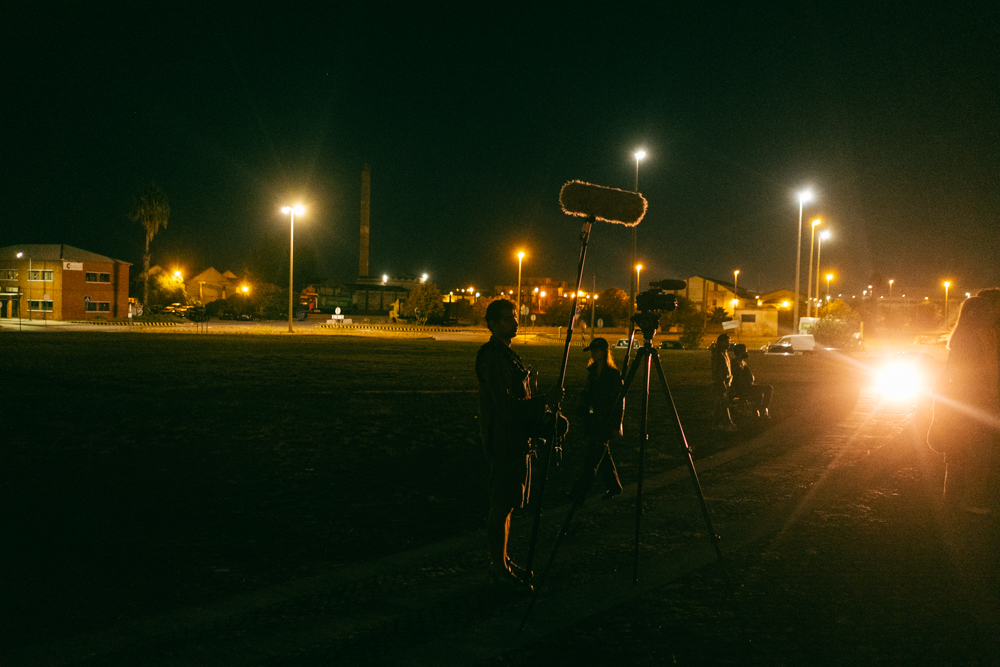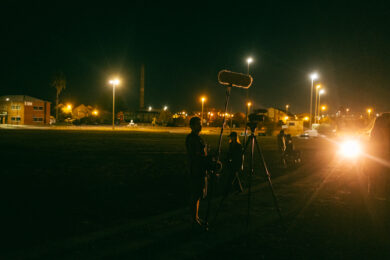There is a peculiar imaginary topography to experimental music. People speak of playing out – far out – but also, of leftfield. There is that dialectics of underground and overground: a question of surfaces and borders, limits and edges. At a festival called Out Fest, I seemed to be spending a lot of time feeling like I was inside of something in some way. Enclosed, secreted, travelling inwards. Listening to Leila Bordreuil’s set at post-industrial warehouse venue ADAO was an experience a lot like being trapped in an electrical substation. The building is on fire. There’s no way out. A Biblical swarm of very angry bees has just flown in and their circling you menacingly. The Brooklyn-based cellist wields white noise like a chef wields a knife, hacking out great chunks of static, shredding cello harmonics in the midst of a lighting storm of her own creation. The sound was heady and all-encompassing. Just a few hours earlier I had arrived late, thanks to a delayed flight from Heathrow, in the middle of Rashad Becker’s set in the municipal theatre, Os Penicheiros. It felt very much like being swallowed and digested by some semi-sentient steampunk machine. I’m reminded of the distinctive crunch of twisted rubber, the sound design to certain science fiction films, recorded whale calls. Maybe this is how Jonah felt in the belly of the leviathan?
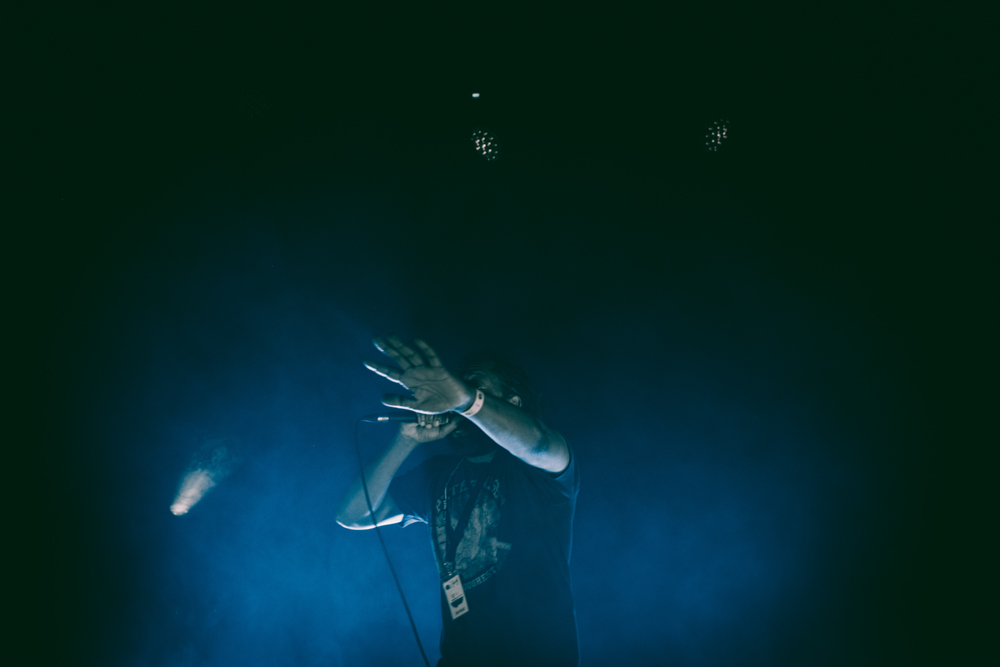
Later that night, Billy Woods raps in the ecstatic style of a street preacher over woozy, crackling beats. At times, during the set, I could almost have been at a political rally. But Woods isn’t trying to convert us to anything. It’s more like he’s in the process of working something out. Slowly we’re drawn deeper and deeper into his anxious psychodrama. The samples often sound like dream fragments of late night TV or midnight movies. Each loop bristling with the texture of memory. Like a great actor, Woods has a gift for making his stories sound like they just came to him that moment, making every internal rhyme, every deft lyrical filip sound like miraculous serendipity. As with many a therapy session, things had kicked off kind of shakily. There were a few false starts, some weird buzzing noise that needed sorting. But once it got going, it was electrifying. By half-twelve, the room was thick with the fug of weed smoke. “If there’s one thing I’ve found about Portugal, it’s that the rules are kind of optional,” Woods murmurs from the stage as he skips past the venue curfew. Of course, everyone cheered him on into the small hours.
Where Woods’ felt like he was inviting us into his private circle, watching Masma Dream World the following night felt oddly intrusive. There was incense burning, propped up in plastic cups on stage, and the room filled with dry ice. Draped in red, wearing a golden tiara, Devi Mambouka resembled a Khmer Buddha presiding over a puja. The music itself felt vaporous, full of wisps and drifts. Chanted vocals electronically harmonised into great fog banks then abruptly broken into by wild bursts of cackling and frenetic drumming. I felt like Casaubon, the protagonist of Umberto Eco’s Foucault’s Pendulum, voyeuristically peeking in on some mystic ceremony. It could have been an induction, a rite of ingress.
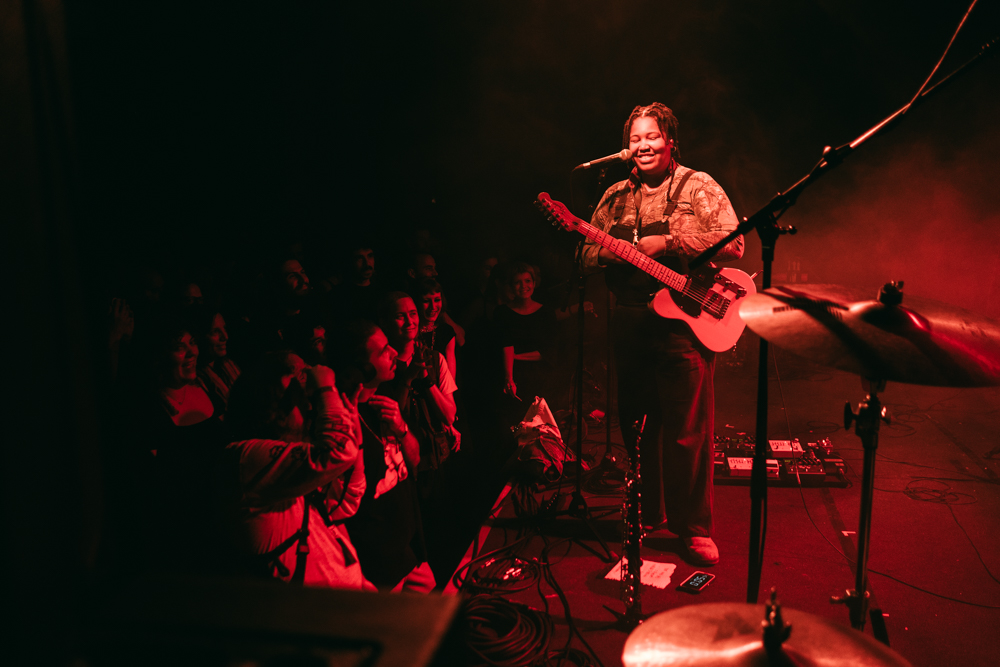
Having never seen Divide and Dissolve live before, I wasn’t quite prepared for just how good Takiaya Reed’s soprano sax tone was. The instrument sounded warm and sweet with just a flutter of vibrato as it introduced a succession of short songs that soon erupted into a fury of heavy riffs and pounding drums, each one a little pocket-symphony with an almost Bruckner-like feeling for the powers of silence and empty space. Left-handed Reed plays a right-handed guitar upside down, channelled through a battery of fx pedals into two massive Marshall stacks. Between songs, she switches off her amps to talk unimpeded by feedback and speaker hum, alternately opening up or exhorting the end of imperialism. In these moments, there was something of that strange giddiness shared by fledgling romances and political occupations – a feeling expressed as much in the noisy beatitude of the songs themselves. Reed is beaming throughout. I’m not sure if I’ve ever seen anyone onstage looking so happy to be there. The joy is infectious. From my spot in the crowd, I find myself beaming right back at her. Being there felt less like watching something; more like being a part of something.
Martina Berther’s electric bass solo felt murky and muddy, like scrabbling through undergrowth, digging down – or being buried alive. Alone on stage at the Sala 6 jazz club, head bobbing rhythmically throughout, the Swiss musician seemed to be channeling eldritch chthonic energies via the crunch of distortion and silvery quavering of tuning forks pressed up against her instrument’s pick-ups. Tashi Dorji, immediately afterwards, evoked other elemental energies. Hammering at the bridge of his guitar like a compact gamelan orchestra, the sound came metallic and crystalline. In a better timeline, this crisp, jagged sound might provide the soundtrack for the interior of Superman’s Fortress of Solitude deep in the Arctic region.
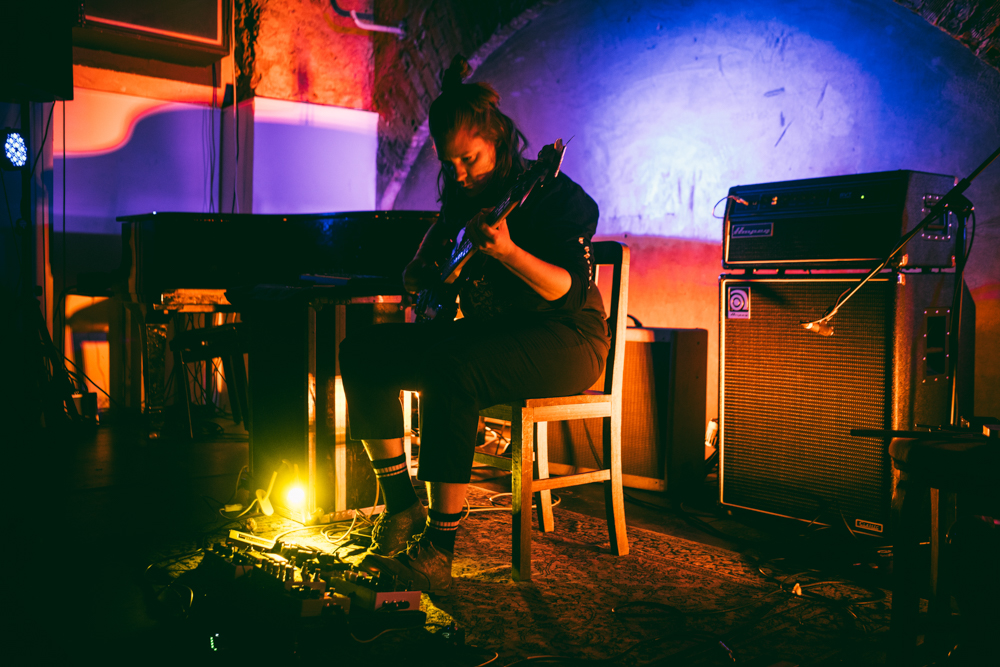
For their opening set at ADAO on the Saturday night, Amuleta Apotropaico constructed an environment out of sound. Standing on stage behind a silvery disc on a tripod (presumably the ‘apotropaic amulet’ in their name), the pair of young Porto musicians loomed over a table strewn with synth modules. All the sounds were electronic (bar the occasional drawn-out toot from a transverse wodden flute); there were no field recordings and no natural sounds. But it built up a sense of terrain just as surely as Louis and Bebe Barron’s ‘electronic tonalities’ in Forbidden Planet, albeit using different means: insect-like skitterings of percussion, tectonic movements of bass, the howling of winds, acres and acres of echo and reverberation. It felt like a place one might inhabit, walk around in. Then gradually, subtly at first then building, they burnt that place down to the ground.
The final night of the festival took us into Barreiro’s old industrial zone. Not much more than a century ago, this city was transformed from a sleepy fishing village to an industrial powerhouse. Much of that growth was down to one man: the Lisbon-born entrepreneur Alfredo Da Silva, whose concrete mausoleum still stands on top of the grounds of a former worker’s cemetery surrounded by his old factory buildings. Some years ago, I visited the mausoleum of Ho Chi Minh in Hanoi and, let me tell you, in terms of sheer size and grandeur, the final resting place of Bác Hồ has nothing on this monument to the erstwhile director of the Companhia União Fabril.
It is here, in the imposing shadow of that tomb, that we gathered to watch the closing concert by Erik Dæhlin accompanied by the Barreiro Municipal Band, the TAB Choral Group, Pedro Carneiro and the Percussion Group of the Portuguese Chamber Orchestra. It is a work of impressive proportions, at times poetic, at other times utterly surreal. It involved marching bands, old workers’ hymns, spoken poetry, and a set of six large, microtonal metallophones invented 45 years ago by Iannis Xenakis called sixxen.
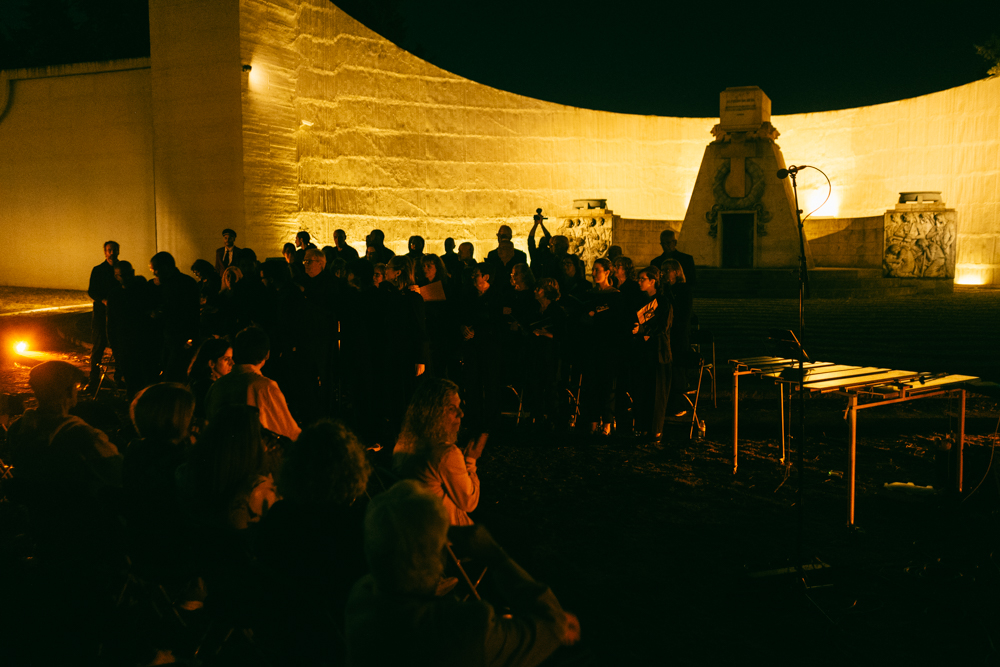
But what fascinated me about the piece was the way it played with the fuzzy borderline between what lay inside and outside the work. The bells that opened the work, issuing from a set of outdoor speakers set up over by the former seating stands of the factory workers’ Santa Bárbara football field, were pitched just so that you almost mistook them for coming from a nearby church. Was the guy who cycled past at one point with a portable speaker on the back of his bike part of the work? (I think so.) What about the three joggers running by shortly afterwards? (I’m less sure.) And the small gaggle of older ladies sat next to me who gossiped throughout the piece? (At this point, who knows?)
The work really took advantage of the vast open spaces of the industrial zone, with many instruments widely spatially distributed, circling the audience’s perimeter or approaching from behind. Space took on the character of a compositional parameter, almost an instrument in its own right. With its clangs and ticks and massed voices, it made for an industrial oratorio to rival Arseny Avraamov’s symphony of factory sirens. Though the composer Dæhlin was born in Oslo, trained in Tromsø and by all acounts only spent a few weeks here in the city, the whole work felt like an epic journey into deep Barreiro, a tunnelling headfirst towards the core.

